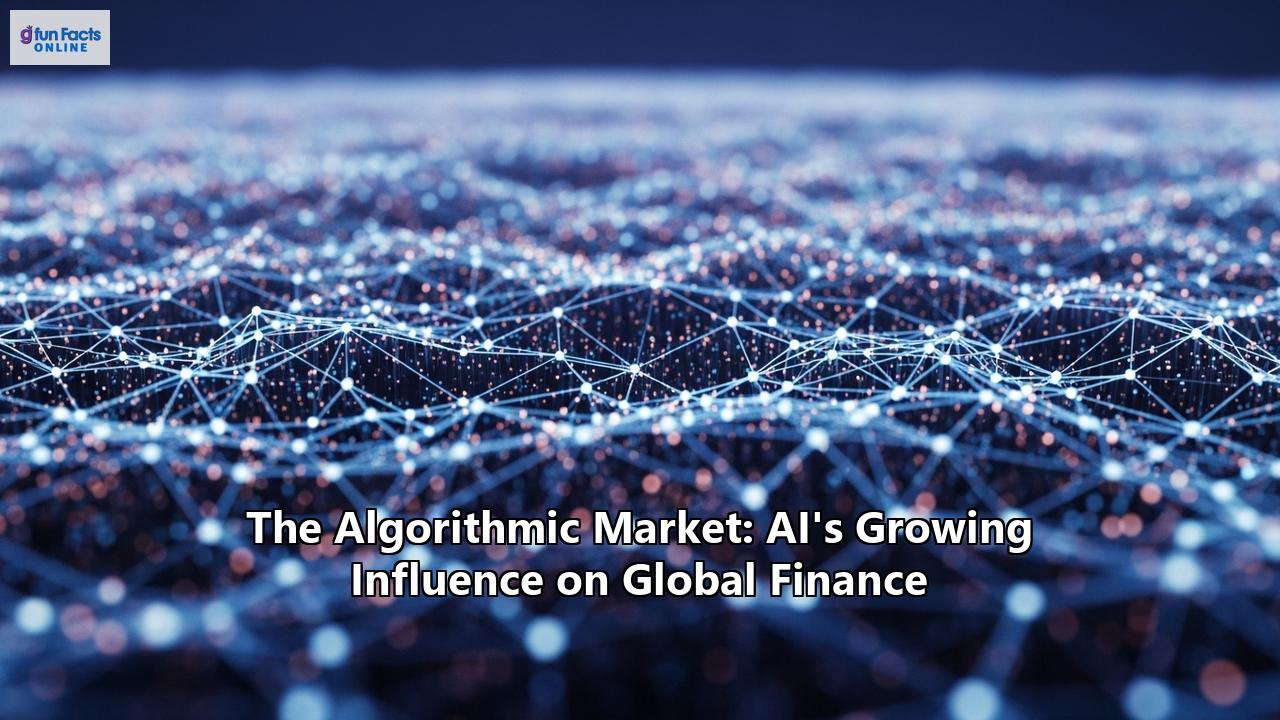An unseen revolution is reshaping the very foundations of global finance. It's not happening in the bustling trading pits or the grand halls of established banks, but in the silent, complex world of algorithms and artificial intelligence. This technological tsunami is creating what is now known as the "Algorithmic Market," a new paradigm where AI's influence is not just growing, but becoming the central nervous system of the financial world. From instantaneous trading decisions to personalized banking, AI is rewriting the rules, bringing with it unprecedented opportunities and a new class of challenges.
The New Masters of the Market: AI-Powered Algorithmic Trading
At the heart of this transformation lies algorithmic trading, which has been a feature of the markets for years. However, the infusion of artificial intelligence and machine learning has elevated it to a new level of sophistication. Today's AI-driven trading systems are not just executing pre-programmed instructions; they are learning, adapting, and making decisions in real-time based on the analysis of vast datasets. These systems can analyze historical data, market trends, and even news sentiment to inform their strategies.
High-Frequency Trading (HFT), a subset of algorithmic trading, exemplifies the sheer speed and power of AI. HFT firms use complex algorithms to execute a massive number of trades in fractions of a second, capitalizing on minute price discrepancies. This has a profound impact on market dynamics and liquidity, increasing market efficiency by rapidly identifying and correcting price discrepancies. The global algorithmic trading market was valued at USD 21.06 billion in 2024 and is projected to reach USD 42.99 billion by 2030, a testament to its explosive growth. In the U.S. alone, the market is expected to reach an estimated USD 1,042.8 million by 2032.
The AI Sentinel: Revolutionizing Risk Management and Security
Beyond the fast-paced world of trading, AI is proving to be an indispensable guardian of the financial system. Financial institutions are increasingly leveraging AI for robust risk management, fraud detection, and regulatory compliance. Traditional risk assessment methods, often reliant on historical data and manual processes, are proving inadequate in today's complex and rapidly evolving financial landscape.
AI algorithms can analyze vast datasets in real-time to identify potential threats, from fraudulent transactions to emerging market risks. These systems can detect anomalies in transactional patterns that would be invisible to human analysts, allowing for the proactive mitigation of risks. This has led to a significant reduction in financial fraud and has enhanced the overall security of the financial ecosystem. Furthermore, AI-powered "RegTech" solutions are helping financial institutions navigate the complex web of regulatory compliance by automating data collection and reporting, ensuring adherence to legal and ethical standards.
A Personal Touch: The Dawn of Hyper-Personalized Finance
The AI revolution is not just about institutional finance; it's also about transforming the individual customer experience. Financial institutions are using AI to offer hyper-personalized services, from tailored financial advice to customized investment portfolios. By analyzing a customer's spending patterns, financial goals, and even life stage, AI can provide proactive and intuitive financial guidance.
Robo-advisors, powered by AI, are already providing personalized investment management to a broad range of clients. Looking ahead, the trend is moving towards even more integrated and personalized financial experiences, where AI-driven insights are embedded into everyday banking and financial planning. This could democratize access to sophisticated financial advice, making it available to a much wider audience.
Navigating the Uncharted Waters: Challenges and Ethical Considerations
The rapid integration of AI into finance is not without its challenges and risks. One of the primary concerns is the potential for increased market volatility. The speed at which AI-driven algorithms execute trades can lead to "flash crashes" and other forms of market instability. There are also significant concerns about algorithmic bias. Since AI models learn from historical data, they can perpetuate and even amplify existing biases, leading to unfair outcomes in areas like loan approvals.
The "black box" nature of some complex AI models, where the decision-making process is not transparent, also poses a significant challenge for regulation and oversight. Regulators and financial institutions are grappling with how to ensure the fairness, transparency, and accountability of these systems. Furthermore, the increasing reliance on a few third-party AI service providers could create new systemic risks.
The Future is Algorithmic: What Lies Ahead
The trajectory of AI in finance points towards an even more integrated and autonomous future. Experts predict that AI will become central to the strategies and operations of financial institutions. The global AI in finance market is a testament to this, with projections showing a rise to $190.33 billion by 2030.
We can expect to see the rise of even more sophisticated AI, including generative AI that can create novel financial products and strategies. The integration of AI with other emerging technologies like quantum computing and blockchain is also on the horizon, promising to unlock new levels of computational power and security. As AI continues to evolve, the focus will likely shift from simply automating tasks to leveraging AI for higher-level strategic decision-making.
The journey into the algorithmic market is an ongoing one, filled with both immense promise and significant challenges. Striking the right balance between innovation and responsible implementation will be crucial in harnessing the full potential of AI to create a more efficient, secure, and accessible global financial system. The one certainty is that the influence of algorithms will continue to grow, fundamentally reshaping the world of finance as we know it.
Reference:
- https://ena.vc/ai-in-finance-the-rise-of-algorithmic-trading/
- https://chartered-investment.com/en/media/news/ai-in-the-financial-sector-current-trends-and-developments/
- https://showme.missouri.edu/2024/transforming-markets-how-ai-driven-insights-are-shaping-the-future-of-finance/
- https://www.grandviewresearch.com/industry-analysis/algorithmic-trading-market-report
- https://www.fortunebusinessinsights.com/algorithmic-trading-market-107174
- https://www.ey.com/en_gr/insights/financial-services/how-artificial-intelligence-is-reshaping-the-financial-services-industry
- https://www.netsuite.com/portal/resource/articles/financial-management/ai-financial-risk-management.shtml
- https://centelli.com/ai-financial-risk-management/
- https://nawadata.com/blog/the-role-of-artificial-intelligence-in-risk-management-for-financial-institutions/
- https://leadingbusinessimprovement.com/ai-in-finance/
- https://techinformed.com/fintech-predictions-2025-ai-payments-compliance/
- https://www.deloitte.com/ng/en/services/consulting-risk/services/how-artificial-intelligence-is-transforming-the-financial-services-industry.html
- https://www.lumenova.ai/blog/ai-finance-benefits-risks/
- https://www.blueprism.com/resources/blog/the-future-of-ai-in-finance-financial-services/
- https://www.womblebonddickinson.com/uk/insights/articles-and-briefings/what-future-ai-financial-services-looks
- https://innowise.com/blog/fintech-trends/
- https://www.avenga.com/magazine/top-fintech-trends/
- https://futuremaster.net/ais-role-in-investment-and-market-behavior-shaping-the-future-of-finance/
- https://www.imf.org/en/News/Articles/2024/09/06/sp090624-artificial-intelligence-and-its-impact-on-financial-markets-and-financial-stability
- https://www.fsb.org/2024/11/the-financial-stability-implications-of-artificial-intelligence/
- https://galapagoscapital.com/en/imf-2025-the-real-impact-of-artificial-intelligence-on-finance-and-regulation-2/
- https://www.ecb.europa.eu/press/financial-stability-publications/fsr/special/html/ecb.fsrart202405_02~58c3ce5246.en.html
- https://www.coherentsolutions.com/insights/ai-in-financial-modeling-and-forecasting
- https://bookmap.com/blog/the-future-of-algorithmic-trading-trends-to-watch-in-2024

